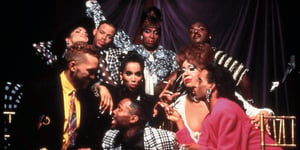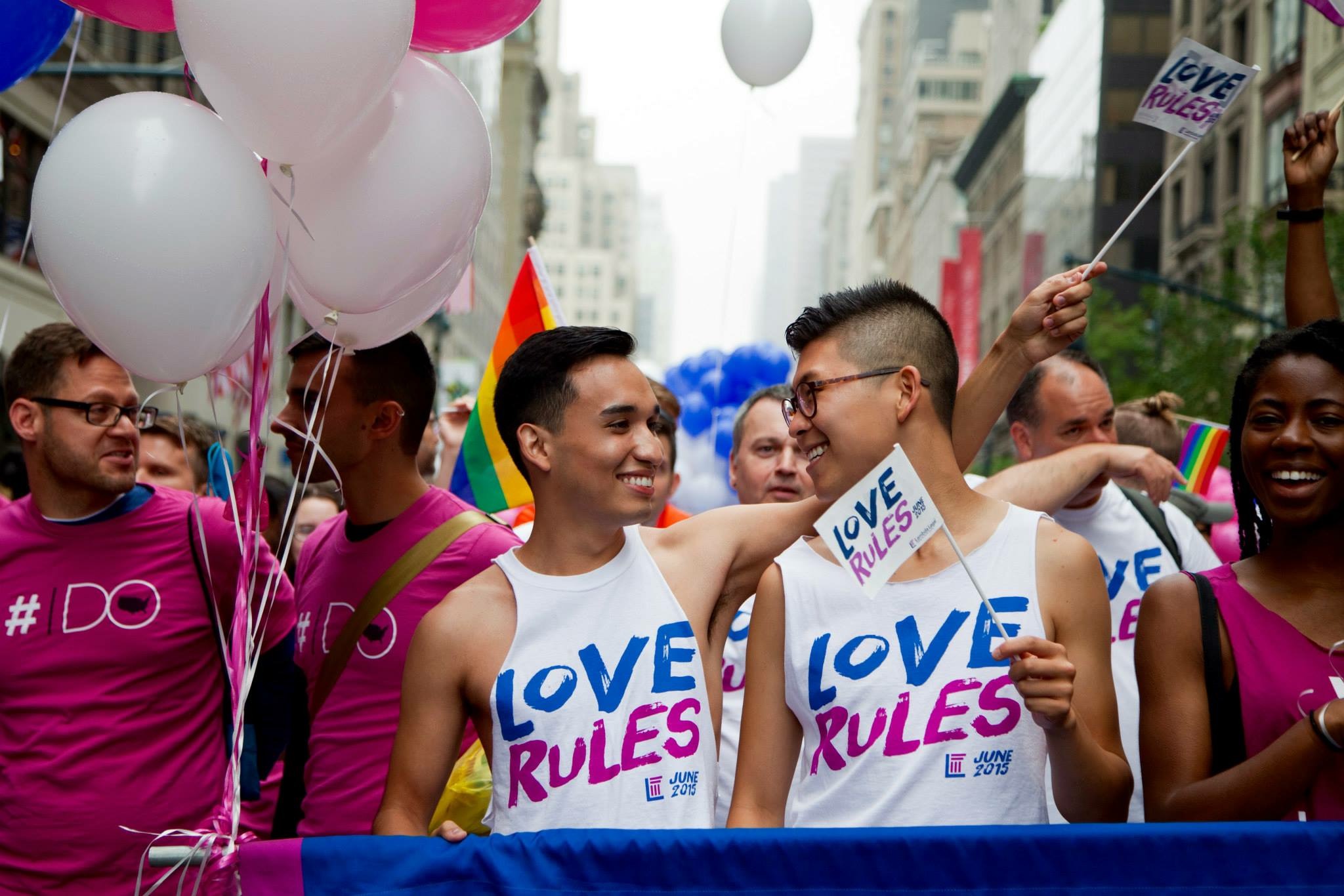Photo:
Point Scholar Kyle Ranieri (left) celebrates the Supreme Court's ruling that all states must legalize same-sex marriage on June 26th, 2015 in New York City.This summer I completed a 10-week internship at Lambda Legal’s national headquarters in New York through the generous support of the Elton John AIDS Foundation. Although the majority of my work focused on HIV research and outreach to marginalized communities, which forms the bulk of my current interests in LGBTQ advocacy work, being a part of the oldest organization fighting for marriage equality and seeing the pinnacle of the movement this summer made my experience especially meaningful. However, while the marriage celebrations were extensive and marriage invitations have begun to arrive, this summer also provided an opportunity for reflection on where our movement is and how much farther we have to go.

As May warmed up to June and the heat sweltered amidst social unrest across the country, I found myself conflicted about how and how much to celebrate the Supreme Court's decision that legalized same-sex marriage nationwide. In the office, we celebrated on June 26th with a champagne and pizza lunch followed by an historic rally at Stonewall; but the next day when I met with an impoverished and hurting community of mostly homeless LGBTQ youth, I didn’t find any similar sentiments—and with good cause, too.
 Over the course of last year, I became interested in HIV/AIDS work when I joined the AIDS Support Coalition at Yale. We work with a local HIV/AIDS in-patient medical clinic for low-income individuals to help provide social services for and, just as importantly, create lasting friendships with the patients. It was at this medical facility that I first started to notice the major inequalities and systemically unfair treatment of people living with HIV, which is only exacerbated because most of the patients here are people of color. This work set the stage for my HIV/AIDS work this summer, and with an interest in pursuing law as career, I found Lambda Legal to be the perfect union for me. My two main HIV projects consisted of an outreach program to the house and ballroom communities of New York City and the development of Lambda Legal’s “Know Your Rights” curriculum for people living with HIV.
Over the course of last year, I became interested in HIV/AIDS work when I joined the AIDS Support Coalition at Yale. We work with a local HIV/AIDS in-patient medical clinic for low-income individuals to help provide social services for and, just as importantly, create lasting friendships with the patients. It was at this medical facility that I first started to notice the major inequalities and systemically unfair treatment of people living with HIV, which is only exacerbated because most of the patients here are people of color. This work set the stage for my HIV/AIDS work this summer, and with an interest in pursuing law as career, I found Lambda Legal to be the perfect union for me. My two main HIV projects consisted of an outreach program to the house and ballroom communities of New York City and the development of Lambda Legal’s “Know Your Rights” curriculum for people living with HIV.
Reaching out and connecting to marginalized communities like the ballroom scene in New York is not easy, because extreme sensitivity and empathy is required when working with any historically exploited community. Our goal was to support the balls that form the center of these communities (as seen in the controversial documentary Paris is Burning) as well as making them into platforms for educating people about HIV and their legal rights regarding the over-policing and excessive criminalization of people living with the virus.
In addition to this project, I facilitated a collaborative effort between Lambda Legal and StoryCorps to record the stories of the ballroom community members. Too often, organizations attempt to help marginalized groups without a sufficient understanding of the individual and societal contexts underlying them, and the collection of interviews we collected will directly inform the work of Lambda Legal and other organizations alike.

Some of the fabulous folks featured in the documentary "Paris is Burning." Image via pride.com
In contrast with the hardships that many individuals in the ballroom community face on a daily basis, I watched and participated in the celebrations of the Obergefell ruling that legally recognized our community’s love. The scenes of proposals in front of Stonewall and hearing the stories of the Obergefell plaintiffs brought tears of joy to my eyes, but those tears were intermixed with disappointing counterparts as I reflected upon the obstacles the LGBTQ community continues to face.
Marriage doesn’t protect us from discrimination in employment or housing, and it certainly doesn’t help homeless LGBTQ youth find safe places to stay at night. What worries me the most about the recent change in the dialogue surrounding LGBTQ rights is that the remaining issues could be abandoned and the new conversation will never take place.
We can’t let that happen. We can’t afford to let Obergefell stand as the last chapter in our story.
This post was written by Point Scholar Kyle Ranieri
 Kyle Ranieri was born in Gallup, New Mexico but spent the majority of his childhood growing up in Lansing, Michigan. He very quickly observed large cultural differences between the two places and was often exposed to poverty and other social problems. With a devoted mindset to counter these ubiquitous problems, Kyle has always maintained a high degree of community involvement. In 2012, Kyle gained his first experience in community organizing when he became an Organizing Fellow and Director of LGBTQ Outreach with Organizing for America, part of the campaign to re-elect President Obama.
Kyle Ranieri was born in Gallup, New Mexico but spent the majority of his childhood growing up in Lansing, Michigan. He very quickly observed large cultural differences between the two places and was often exposed to poverty and other social problems. With a devoted mindset to counter these ubiquitous problems, Kyle has always maintained a high degree of community involvement. In 2012, Kyle gained his first experience in community organizing when he became an Organizing Fellow and Director of LGBTQ Outreach with Organizing for America, part of the campaign to re-elect President Obama.
Read more about Kyle here.

